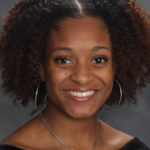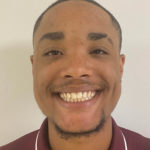
The Secular Student Alliance is home to atheist, humanist, and nonreligious students.
Black Nonbelievers
With 3 in 10 adults in the US claiming no religious affiliation on surveys, the rise of the nones has touched every corner of American society. Over more than a decade, the share of Black Americans who say that they have no religious affiliation has risen more dramatically than whites, Hispanics, or Asians.
Almost 50% of Students are Nonreligious
A 2020 study showed 47% of students are nonreligious - the fastest growing demographic on college campuses.
This generation will likely be the tipping point that changes the demographics of the United States from a majority religious nation to a majority nonreligious nation.
 A junior at Spelman College, Kourtney will pursue a Ph.D. for a career as a college professor, in part, to advocate for the ideas and experiences of all Black people and address how systemic racism and sexism in the US are harmful to marginalized communities. She says, “my dedication to secularism and the social promotion of Black and Brown people influences me to learn more profoundly about myself. Being a Black woman in America is inherently political.”
A junior at Spelman College, Kourtney will pursue a Ph.D. for a career as a college professor, in part, to advocate for the ideas and experiences of all Black people and address how systemic racism and sexism in the US are harmful to marginalized communities. She says, “my dedication to secularism and the social promotion of Black and Brown people influences me to learn more profoundly about myself. Being a Black woman in America is inherently political.”

Daniel is a junior communications major at Morehouse College. When Daniel was 9, his grandfather shed light on the idea that there was no higher power after Daniel’s mother was unable to answer some of his questions about Christianity. Growing up, he did not tell others that he was a nonbeliever. He says it is important to allow more black men and women to view life from a different spectrum and not be bound by the shackles of religion.

Jamie is a psychology major at the University of South Florida. She plans to promote access to quality mental health care and fight against pseudoscience. Her family was Catholic, but never really went to church. The hypocrisy of the church led Jamie to be agnostic. As a Black first-generation immigrant, Jamie knows how many Caribbean-Black people were forced into Christianity. She says the Secular Student Alliance creates a space where like-minded students can be themselves without feeling shame or judgment.
Hundreds of Student Chapters
The Secular Student Alliance is a nationwide network of student-run chapters in high schools, colleges, and universities.
There are many atheist, humanist, nontheist, and questioning students just like you… who want to have like-minded friends, have fun, and make a difference. There are thousands and thousands of brilliant and courageous students in America whose values and morality are based upon inherent human goodness. Make like-minded friends, be part of a secular community on your campus, and be a secular activist.
Membership is always free for students.
It's quick and easy. We are here to help.
“I just know [questioning religion] is right and I feel it’s important for me to share that with my family because they don’t hear different opinions that may not agree with them. They know I’m a great person and the fact that I am an atheist makes it even better because I’m breaking down stereotypes and negative connotations.”
~ Michael, Rogue Community College

What is Secular?
“Secular” can mean a variety of interrelated beliefs and values depending on what the term is being applied to. Concerns for life in the here and now, as opposed to matters of eternity, are considered secular. Secular is the opposite of sacred or religiously-focused.
The term “secular” is often applied to a person or group of people and refers to non-religious people. For example, when we talk about secular students, we generally mean students who do not adhere to any religion, though not always.
Secular is a broad, inclusive category that includes people who would also claim other philosophies, worldviews, and identities: atheist, agnostic, humanist, nonreligious, and religious.
Secular can also refer to the realm of politics and public affairs. When used in this way, secularism refers to the view that our government and religious institutions should be kept strictly separate and the government is neutral in matters of religion.
Atheist, Agnostic & Humanist
Atheist: An atheist is someone who does not believe in gods. That’s it. Atheists look at the world and decide that they don’t have enough evidence or reasons to believe in any of the gods that have been proposed.
Agnostic: The word “agnostic” means “not knowing.” Agnosticism, in this context, is the position that the question of God’s existence is not known and cannot be known because there is not enough evidence one way or the other.
Humanist: Humanism is a positive life philosophy that, without reference to the supernatural, human beings can live ethical lives. Humanists emphasize the importance of human agency in solving our problems and creating a world that prioritizes human flourishing.
Nonreligious: Sometimes referred to as the “nones,” the nonreligious are those who mark “none of the above” when asked which religious group they belong to. They may identify as spiritual but they do not adhere to any one religion or another.
A Secular Nation
The United States was founded as a secular nation with the commitment to the “separation of state and church” written into its founding documents. The First Amendment to the US Constitution reads:
Congress shall make no law respecting an establishment of religion, or prohibiting the free exercise thereof.
In other words, the US government neither favors one religion or another, nor any religion at all. Americans are free to be Muslim, Buddhist, Jewish, Christian, Hindu, or nothing at all.
In a secular society like the United States, public policy and law should be based on scientific evidence, reason, and shared values about the dignity and worth of all people. One need not identify as secular, personally, to be supportive of secularism as a social framework.
Many religious people support secularism and the separation of church and state. In fact, Baptists were among the most strident supporters of this principle. As far back as the early 17th century, the English Baptists argued for freedom from state interference in religious matters.
